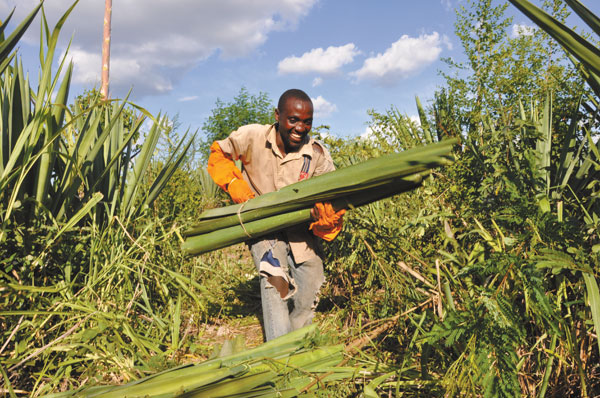
Chinese agricultural techniques help Tanzanian farmers realize better crop yields, reports Zhao Yanrong in Dar es Salaam
 |
|
A Tanzanian farmer lays out sisal fiber to dry in the sun. Sisal, a plant that yields a stiff fiber, is widely used in construction and manufacturing industries. Zhao Yanrong / China Daily |
Though infrastructure still remains the top draw for China in Africa, agriculture is fast emerging as a viable investment option for several Chinese companies and institutions.
More importantly the seeds of the Sino-African agricultural alliance are being sown in Tanzania, the first African nation to get support from China for infrastructure projects.
Unlike most of the conventional agricultural alliances, the Chinese engagement in Tanzania is rather unique in the sense that it is a collective arrangement.
Most of the agricultural projects involve Chinese professionals and Tanzanian farmers working collectively to raise agricultural yields, using modern techniques and practices.
Knowledge transfer
The positive influence of these alliances is best reflected in two farms operated by Chinese professionals in Morogoro region in the southern highlands of Tanzania, about 300 kilometers from Dares Salaam, the capital of the country.
Xiao Wei, a doctoral student from the Chongqing Academy of Agricultural Sciences and a rice specialist at the Center for China Agricultural Technology in Dakawa in the Morogoro region, says that he believed initially that success was something that could only be created in the laboratories.
"My opinions changed after my experiences in Tanzania. I was surprised to learn that Tanzanian students were not only adept in learning the new rice-growing techniques, but equally fast in utilizing the technologies commercially," he says.
"We were equally surprised to discover that many of the basic techniques that we use in China makes a big difference in boosting yields in Africa."
The center is a project set up under the aegis of the China-Africa Cooperation Summit held in Beijing in 2006, and it is one of 10 such units in Africa. The 62-hectare project was set up in October 2009 by the Chongqing Sino-Tanzania Agriculture Development Co with a $6 million grant provided by the Chinese government.
During the project's handover ceremony in 2011, Tanzanian President Jakaya Mrisho Kikwete expressed the view that it would be a vital cog in Tanzania's agricultural development plans.
The center mainly focuses on research and training for Tanzanian farmers, especially in Chinese agricultural techniques like advanced seed technology.
The center has set up a two-hectare experimental field, a seven-hectare exhibition field, and a chicken farm with a variety of farm irrigation facilities.
It currently has 11 agricultural experts from China, specializing in growing rice and corn, vegetables and poultry cultivation. More than 300 local farmers receive systematic training courses at the center every year.
Chinese experts from the center have already managed to raise the average yields of hybrid rice to between nine and 12 tons per hectare, a fourfold increase of local rice yields.
The hybrid rice seeds introduced by the Chinese center is expected to help Tanzanian farmers to produce enough rice for domestic consumption and export, says Christopher Chiza, the Tanzanian minister for Agriculture, Food Security and Cooperatives.
"We are inputting the modern agricultural knowledge to Tanzanian farmers so that they can achieve their goal of independent agricultural development," says Chen Hualin, a professor from the Chongqing Academy of Agricultural Sciences and currently a member of the agricultural center.







